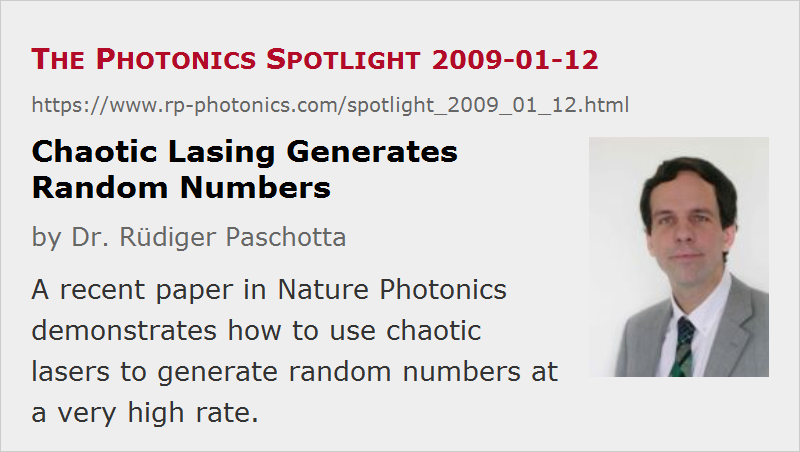Chaotic Lasing Generates Random Numbers
Posted on 2009-01-12 (revised on 2010-03-23) as a part of the Photonics Spotlight (available as e-mail newsletter!)
Permanent link: https://www.rp-photonics.com/spotlight_2009_01_12.html
Author: Dr. Rüdiger Paschotta, RP Photonics Consulting GmbH
Abstract: A recent paper in Nature Photonics demonstrates how to use chaotic lasers to generate random numbers at a very high rate.

Ref.: A. Uchida et al, “Fast physical random bit generation with chaotic semiconductor lasers”, Nature Photon. 2, 728 (2008); I. Reidler et al., Phys. Rev. Lett. 103 024102 (2009); I Kanter, Nature Photonics 4, 58 (2010)
Random numbers are required for many purposes, such as cryptography, simulations or various calculations. In some cases, a very high “quality” in the sense of high randomness is required, which excludes the use of software-based random number generators, which actually generate only pseudo-random number sequences. For a truly random output, some random physical mechanism, ideally based on quantum effects, should be utilized. The challenge is then to do this in an economical way, and (at least for some applications) to produce the random numbers at a large rate – sometimes more than a few millions per second.
According to the first paper referenced above, Japanese researchers have demonstrated this using a relatively simple setup, containing two laser diodes obtaining some significant optical feedback, which results in chaotic intensity fluctuations. A digital signal is generated from each laser output simply by power detection with a photodiode and a 1-bit analog-to-digital converter (actually a simple comparator with adjustable threshold level). The two outputs are then simply combined with an XOR gate, and not processed any further. This results in a bit sequence with a rate of up to 1.7 Gbit/s, and the randomness has been carefully checked with a variety of stringent tests.
The second paper reports an experiment with only a single laser diode (with somewhat more sophisticated data processing), generating random numbers with up to 12.5 Gbit/s. In the third paper, that rate is even increased to 300 Gbit/s.
Low-power laser diodes are particularly well suited for such purposes, not only because they are relatively cheap and available in fiber-coupled form, but also because they contain a rather short laser resonator with high gain and losses per round trip. This makes the random evolution rather fast. Within a time interval of the order of one nanosecond, such a laser does many chaotic oscillations under the influence of quantum noise and other influences, and totally “forgets” its initial state. Therefore, one can interrogate the output more than once per nanosecond without having any correlation between subsequent results. With a much longer fiber laser, for example, the possible bit rate would be much more limited.
This article is a posting of the Photonics Spotlight, authored by Dr. Rüdiger Paschotta. You may link to this page and cite it, because its location is permanent. See also the RP Photonics Encyclopedia.
Note that you can also receive the articles in the form of a newsletter or with an RSS feed.
Questions and Comments from Users
Here you can submit questions and comments. As far as they get accepted by the author, they will appear above this paragraph together with the author’s answer. The author will decide on acceptance based on certain criteria. Essentially, the issue must be of sufficiently broad interest.
Please do not enter personal data here; we would otherwise delete it soon. (See also our privacy declaration.) If you wish to receive personal feedback or consultancy from the author, please contact him e.g. via e-mail.
By submitting the information, you give your consent to the potential publication of your inputs on our website according to our rules. (If you later retract your consent, we will delete those inputs.) As your inputs are first reviewed by the author, they may be published with some delay.
 |




If you like this page, please share the link with your friends and colleagues, e.g. via social media:
These sharing buttons are implemented in a privacy-friendly way!